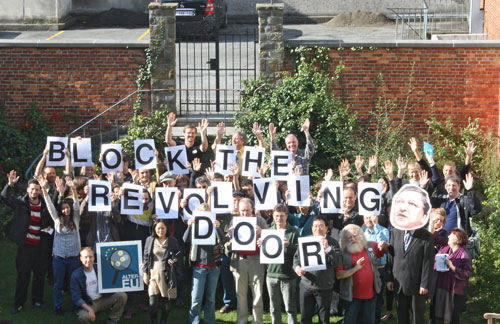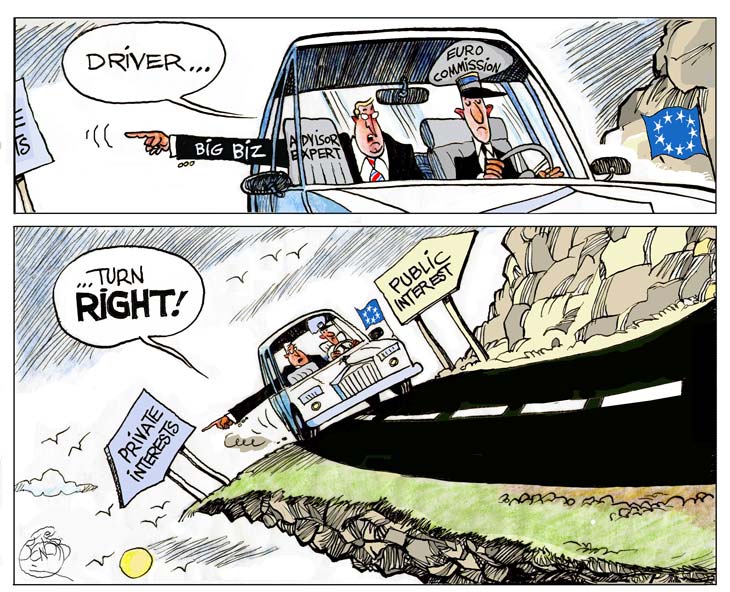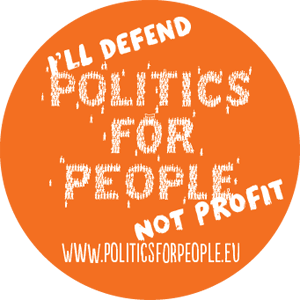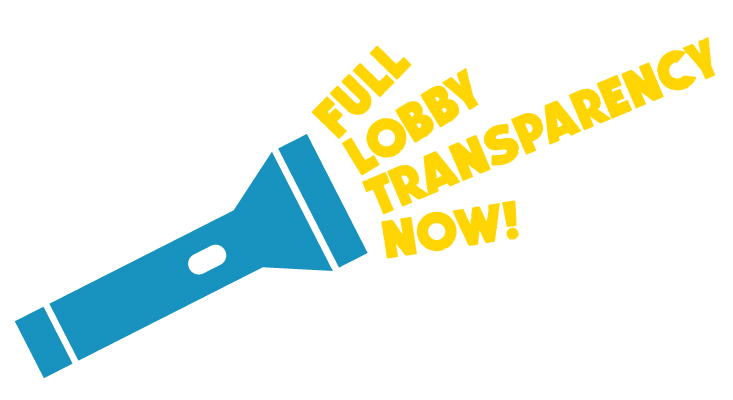A listicle of ALTER-EU's key campaign achievements from the past 10 years.
1. 75 MEPs 'pinned down' to support lobby transparency 2009
During the 2009 European elections, ALTER-EU worked with other pan-European coalitions to seek pledges from prospective MEPs. 75 MEPs pledged to “promote a mandatory system of registration and reporting for all lobbyists influencing EU policy making”, providing a core group of support in the new Parliament for lobbying regulation.
2. First European Commission-Parliament lobby transparency register 2011

In 2008, the Commission launched its first lobby register. The register, as today, was only voluntary so many lobbyists did not bother to sign up. It was also wracked with inaccurate information and under-reporting of spending on lobby activities. After significant ALTER-EU campaigning, a major step forward was taken in 2011 when the European Parliament joined the Commission as co-organiser of the register and decided that no one benefitting from a Parliamentary access pass could remain unregistered. The register was re-launched, although many of the previous problems remained. More info here.
3. Improved revolving door rules for Commissioners 2010-11
The end of the Barroso I Commission in 2009-10 was ignominious when five commissioners left for corporate roles which provoked the risk of possible conflicts of interest. Most scandalously, Günther Verheugen set up his own consultancy (and failed to notify the Commission in advance) and Charlie McCreevy joined the Bank of New York Mellononly a year after leaving office, having presided as commissioner, over a period of intense liberalisation in the financial sector which contributed to the financial crisis! ALTER-EU delivered a petition to the Commission demanding a change in the rules and the Code of Conduct for Commissioners was eventually reformed to introduce an 18-month ban on departing commissioners carrying out lobbying. More info here.
4. New ethics rules for MEPs 2011-12

In March 2011, the cash-for-second jobs scandal hit the European Parliament and three MEPs were exposed as willing to table amendments in return for lucractive consultancy contracts. Two were later given jail sentences in their own country. The uproar prompted the European Parliament to create its first Code of Conduct for MEPs. ALTER-EU was there: carrying out research to expose the problems of MEPs holding second jobs and proposing solid suggestions for new rules. The new Code, while flawed, nonetheless represented a step forward and brought enhanced transparency to MEPs outside interests. More info here.
5. Better revolving door rules for EU staff 2012-13

The revolving door is a problem across the EU institutions, and ALTER-EU worked with MEPs to successfully change the rules for officials to introduce a ban on lobbying for senior officials for 12 months once they have left office; transparency on senior officials' revolving door moves; and new procedures to asess possible conflicts of interest for all incoming staff. While these rules represented a step in the right direction, more action is needed to prevent possible conflicts of interest arising from the revolving door. More info here.
6. European Ombudsman demands Commission action on expert groups 2013-15

Following an ALTER-EU complaint which critiqued the Commission's industry-dominated advisory groups (the so-called 'expert groups'), the European Ombudsman found numerous cases of Commission maladministration andbacked both ALTER-EU and MEPs' demands that expert groups should be made more balanced. ALTER-EU has consistently argued that while expert groups are supposed to help the Commission draft laws in the interests of European citizens, in reality too many groups have simply delivered benefits to major corporations. In 2014, when Commission progress appeared to stall, the European Ombudsman opened a new enquiry on expert groups and has made further, positive recommendations. More info here.
7. 180 MEPs commit to action to tackle excessive lobbying influence 2014

During the 2014 European parliamentary elections, ALTER-EU coordinated the Politics for People campaign. Working across 20 EU member states, more than 1350 election candidates pledged to "stand up for citizens and democracy against the excessive lobbying influence of banks and big business"; 180 of these were elected to become MEPs. ALTER-EU has since been coordinating with these members to help ensure they can follow through on the pledge. More info here.
8. Commissioners banned from meeting with unregistered lobbyists 2014
In December 2014, two important new rules were introduced by the new Commission president, Jean-Claude Juncker. Commissioners, their cabinet members, and directors-general could no longer meet with unregistered lobbyists; and a list of all their lobby meetings held would be now published on the Commission website. While ALTER-EU would like to see both measures extended, the annuncement reflected a significant victory by ALTER-EU and other transparency campaigners who had made lobby transparency such an important issue in the preceding European elections.
9. Ensuring the EU institutions learn the lessons from lobby scandals
Whether it was the Dalligate scandal in 2012 (when Health commissioner John Dalli resigned in connection with a tobacco bribery scandal) or the Petite scandal in 2013 (which saw a lobbying lawyer with Big Tobacco clients heading-up the Commission's ethics committee), ALTER-EU and its members have helped to expose wrong-doing and campaigned vigorously for action and new rules to put things right. More info here and here.
10. Lobby transparency and ethics issues are on the agenda and not going away

After 10 years of consistent research and campaigning by ALTER-EU and other transparency groups, it is clear that lobby transparency and the need to promote ethics and tackle conflicts of interest are on the agenda of the EU institutions. Lobby transparency features prominently on the Commission's 2015 work programme and our work is regularly covered in the EU and national media. The European website of Politico now includes a weekly lobby transparency newsletter.
Despite ALTER-EU's achievements over 10 years, Brussels is still a lobby hotspot, and tougher rules and regulations are needed to stamp out opaque and unscrupulous lobbying and to ensure that the policy-makers and legislators who decide on the laws affecting 500 million EU citizens, are free from conflicts of interest. ALTER-EU's policy priorities are:
- A legally-binding lobby transparency register which provides an accurate reflection of the lobbying of the EU institutions
- Tougher ethics rules for commissioners, special advisers, MEPs and EU staff to prevent the risk of conflicts of interest
- An end to corporate favouritism in the Commission's lobby meetings and expert groups
More info here.
Read a longer article detailing ALTER-EU's last decade.

